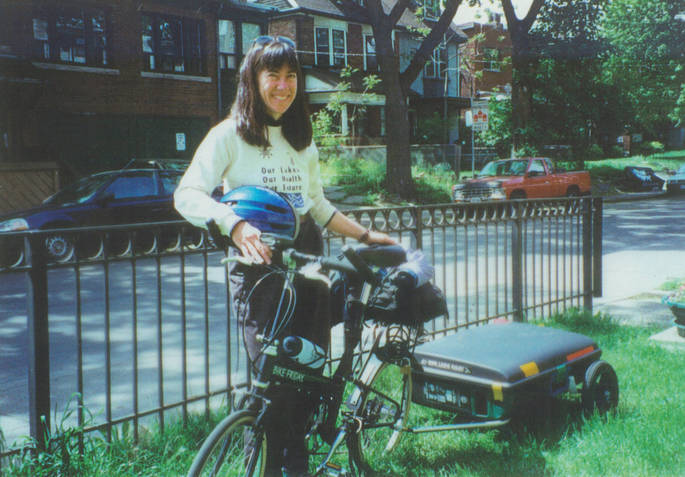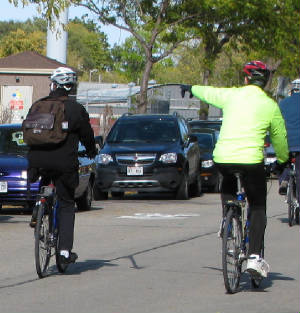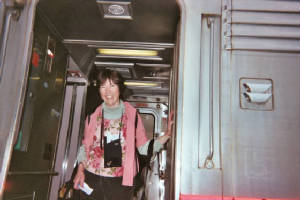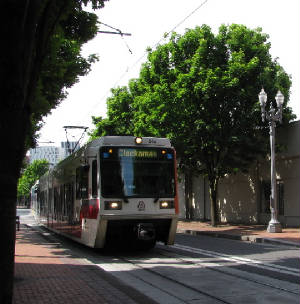|

|
| Katie Alvord with the folding bicycle she used forcar-free book tours when Divorce Your Car! |
Freelance writer Katie Alvord
is best known as the author of Divorce Your Car! Ending the Love Affair with the Automobile. Her non-fiction work has appeared in numerous publications, including the Boston Globe, E Magazine, Orion Afield, The Progressive, Utne Reader,
and more. She also writes fiction and poetry. A former librarian, she has worked with non-profit groups and served on local
environmental and bicycle advisory committees. In 1993, she was recognized as a San Francisco Bay Area Clean Air Champion
for "making a difference" by going car-free and writing about the experience. More recently, her series on climate change
in the Lake Superior basin won the 2007 Science Journalism Award for Online Reporting from the American Association for the
Advancement of Science. She has lectured frequently on environmental topics in the U.S. and Canada. Born and raised in northern
California, she now lives in the Upper Peninsula of Michigan.
Zinta
for The Smoking Poet: As much as I enjoy and learn from reading, I can really say that only a handful of books over my
lifetime have been truly transformative, leaving a long-term effect. Divorce Your Car!
Ending the Love Affair with the Automobile by Katie Alvord is one of those books. It stops me in my tracks … in
my tire tracks. In a very readable, fascinating account of automobile history to a telling of the predictable future of automobiles,
this book is a real wake-up call to reality.
Katie, give us some background about how you came
to write this book. What was your journey to divorcing your car and why was it important to you to share it with others?
Katie
Alvord: Cars
damage our health and the planet in so many ways, and I wanted to do my part to stop the bleeding. This started with a personal
lifestyle change. For years, I had thought of ditching my car for environmental
reasons, but had feared that being car-free might be too limiting. Then, in 1992, I met a series of people who lived car-free
by choice. By not owning cars, these folks were helping to save the planet, but beyond that, they had a level of freedom and
joie de vivre often missing for those of us caught up in the rat race. Seeing their happy, car-free lives inspired me to garage
my car and use my bicycle instead, supplemented by the bus, taxi rides, and carpooling. I lived in a rural area at the time
– not the easiest location for a car divorce, because there was only one bus three times a day – but even under
those conditions, I found it easier than I'd expected to cut back on driving. Car-free travel sometimes took more planning,
and in our car-dependent society, I sometimes felt like a second-class citizen. However, the benefits were fabulous: I lost
weight without trying, my stress level dropped, and I saved a whole lot of money. I
wanted others to know how fun and beneficial car-free travel could be, in contrast to the damage driving causes, and wanted
to encourage others to travel car-free more often. So I started writing essays about car-free life and got some good feedback.
I had also noticed how much our relationship with cars is like a bad marriage, and came up with an outline for Divorce Your Car! that drew heavily on that analogy.

|
| Bicyclists use an on-street bike route in Madison, Wisconsin |
TSP:
This is a very well researched book. How did you take on the research end of this? You’ve covered the history of the
car, which many think begins with Henry Ford in Detroit, Michigan, but in actuality is European in origin …
Katie: Yes,
the automobile was invented in Europe decades before Ford started mass producing cheap Model Ts, expanding cars beyond their
initial status as a luxury item. I loved researching this book because the story of the automobile is so colorful, for better
or worse. I read scads of books and websites to gather quotes and factoids, and had great fun coming across tidbits like gangster
Clyde Barrow's letter to Henry Ford, which included the line: "I have drove Fords exclusively when I could get away with one."
Of course, I also dug into more serious matters which I still find very compelling: for instance, how cars contribute to climate
change, habitat loss, and toxic pollution; how they erode community cohesion; and lots more. Being a former librarian, my
professional training served me well as I did all this research.
TSP:
In a nutshell, if possible, why are cars so damaging to us, to our environment, to our economy, even to our emotional
and mental health? How have cars shaped our society?

|
| Katie Alvord boarding an Amtrak train for a trip from California to Michigan |
Katie: Those
are big questions. Cars do so much damage to the planet that the Union of Concerned Scientists has calculated that driving
is the number one most environmentally harmful consumer activity. Air pollution, oil spills, habitat loss, climate change
– our rampant use of cars worsens all these problems. Economically, cars impose huge costs on us, both as individuals
and society-wide. Our government spends billions to keep oil supply lines open so we can have "cheap" gas. It's not so cheap
when you look at all the hidden costs, such as the large portion of property taxes that pay for roads and traffic police,
or the portion of income taxes spent on wars for oil. As far as mental health, cars also tend to alienate us from each other
and divide communities. Road rage is a great example of how cars can send human emotions spiraling out of control. In Divorce Your Car!, I included this classic quote from someone in the grip of road rage: "I never would have shot
him if he hadn't rear-ended me." Automobiles shape society intangibly, but also physically, literally drawing the maps of
our towns and controlling how we can and can't interact. Cars have caused human communities to sprawl widely over the landscape,
separating us in space. As they allow us to travel from house to car to office in isolation, they also alienate us from nature
and from each other.
TSP:
You propose “divorcing” our cars, using the analogy of marriage, or a toxic relationship, throughout the book.
If complete divorce isn’t possible, perhaps going “car-lite.” Can you explain what that means? And how one
might approach this gradually, with a separation phase, perhaps, prior to divorce?
Katie: When they hear "car divorce," many people associate
the term with getting rid of cars altogether, but that's not what I mean by it at all. Really, I'm saying – let's not
be so married to cars. We're so entrenched in this dysfunctional automotive relationship
that it's often hard for us to imagine being mobile without driving. But doing so occasionally, when there really is no better
choice, is very different from treating a car as your partner in life.
Divorce from a human spouse can take many forms, and so can divorce from a car. It can range from
selling the car (analogous to dumping the spouse and never seeing them again) to simply driving less (comparable to an amicable
divorce where you and your spouse still have occasional get-togethers). Either way, I still consider it "divorce."
In the book, I define a "car-free" divorce as one in which you don't own a car, and travel mainly
by transit, walking, or biking, perhaps sometimes renting a car or using a car-share car as need arises. I define a "car-lite"
divorce as one in which you still own a car, but use other travel modes more often. Either way, the most important part of
a car divorce is a shift in attitude, away from the mindset that travel requires getting behind a steering wheel.
To do this gradually, I suggest a trial separation. Add car-free travel to your life a bit at a
time. Take easy steps first, like walking to the nearest store occasionally. You might pick a day to go car-free and see how
it works for you. Dust off your bicycle and check out transit services in your area in advance. I've interviewed people who
started with this one-day approach, then little by little increased their number of car-free days each week until they weren't
using the car at all. It's very empowering to do this.
TSP:
Katie, you live in Houghton, a small city in Michigan’s Upper Peninsula. While you do face harsher challenges than most
in coping with winter weather, you have the advantage of living near the center of town, yes? How far are you from the basic
needs most of us, food, entertainment, health care, library, etc.? What are your longest walking and biking distances?
Katie:
I have lived in town centers, and that definitely
works best if you want to live car-free. Right now, though, I live about 12 miles from the center of Houghton. So I'm that
distance from the public library and about 14 miles from the Keweenaw Food Coop, which has the best local selection of organic
foods. But we meet a lot of our needs at home: I work at home, we grow a portion of our own food, and my husband and I are
pretty good at entertaining ourselves!
At times, we have lived car-free in this spot, but since my husband bought a Prius a few years
back, we've been a car-lite household. Still, car-free travel has continued to be a big part of my life. I love to walk and
can happily stroll four or five miles in a day. I have a couple of bikes, one with snow tires that I use during the long Keweenaw
winters.
Biking in snow is not that hard if you're prepared for it; as my husband's Norwegian relatives
say, "There's no such thing as bad weather, only bad clothing." I sometimes bike the 24-mile round trip in and out of town
for errands, and sometimes share rides with friends. If my husband and I drive in together, we batch our errands so we can
take fewer trips.
Once or twice a month, I drive the car myself for some special circumstance. For long-distance
trips, I often take Amtrak. A few years ago, I wrote a week-long series for Grist about the various ways I travel, and it's still a pretty accurate description of how I get around.
TSP:
Relatively good health seems to be a necessity in going without a car. Even getting to public transportation hubs can require
some walking. I’m thinking now about my elderly parents, one of whom has trouble walking just a few steps let alone
miles. What are your suggestions for people who may be similarly physically disadvantaged?
Katie: I'm so glad you asked this question. It points out
yet another way that cars create inequities in society. We have spent so much money on cars and roads that we've starved public
transport – despite the fact that as much as a third of the population is unable to drive due to being too young, too
old, or disabled. We should be doing a much better job of providing options that give non-drivers better independent mobility.
In the case of disabled seniors, many communities do have paratransit services, small buses or jitneys that provide door-to-door
transport, and I'd like to see these expanded. In addition, I do think there is a role for some private motor vehicle use
for those with disabilities. At the same time, though, there are more non-motorized transport choices for the disabled than
we often think. I've seen some incredible hand-pedaled bikes and trikes, for instance, designed for amputees or paraplegics.
TSP:
I was very moved and motivated by reading your book, and have great intentions about coming years, to someday get that divorce.
But, I have to admit, today I commute more than 100 miles a day, living in one city, working in another. Too many reasons
to go into here, but toss in bad housing market, family proximity, and other such, but after looking into moving, I chose
to stay where I am. Ride share may be an option some of the time, but my hours tend to be irregular. So I read your book,
and I have sworn to walk more for errands in my home community—but that commute will probably stay as it is for some
years yet. Am I missing something in this picture? I imagine there are quite a few like me, with variations on reasons for
long commutes.
Katie:
Yes, there are a lot of us with complicated
lives, and in Divorce Your Car! I do suggest that people choose how to travel with
their own circumstances in mind. Not everyone can go car-free, but going car-lite is always an option – your idea to
walk more for errands close to home is a perfect example. Your situation is also a great example of how much difference location
can make in ease of driving less. There are usually more car-free options available to us, wherever we live, than we generally
think about. Even if you don't get rid of your car, every trip you can either avoid or take without driving is a benefit to
you personally and to the planet.
TSP:
When your book addressed best places to live for public transportation, I noticed that all were major cities. A large city
definitely has an advantage of mass transportation. My daughter, for instance, lives in Chicago and has been sans car for
seven years, tried having one for a couple years, hated the parking issues and car maintenance costs, and now is living without
a car again. In Chicago, that’s almost the easiest option, whereas in more rural areas, it is much more complicated.
What are your suggestions for more rural areas?
Katie: Mass transit needs a certain population density to
be cost-effective, and that's why it's more difficult in rural, sparsely populated areas. But even without transit, there
are ways to reduce driving. Sharing cars or trucks with neighbors, sharing rides, and biking or walking to places close enough
to do so are all very possible in rural locations. Some rural areas have done more with organized ridesharing, such as "The
Reg," a ride registry originating in a rural part of California. People who signed up for this program got safety clearances
from the local sheriff's department, then were issued a laminated ID card which they could hold up, hitchhiker style, to solicit
rides from similarly checked drivers in the program, also with ID cards. I also like an idea from the book Plan C (another book from New Society Publishers) for organizing jitney networks in rural areas. The book suggests
pairing telecommunications with small vehicles to create a kind of real-time shared transport network.
TSP:
You discuss many other car options in your book, using different kinds of fuels and power sources, but pretty much conclude
that there is no such thing as an environmentally responsible car. For those who must still use one on occasion, what choices
would you recommend? Why are the new hybrids and electric cars not as good as we first thought?
Katie: Ultimately, I'd like to see far fewer motor vehicles
in the world, with those vehicles fueled by something other than petroleum. We already have a range of alternative-fuel vehicles
to choose from, including hybrids and electric cars as well as biodiesel. Any one of those is far better than a gasoline-powered
internal combustion car. Even so, widespread conversion to cleaner fuels won't solve all our automotive problems. Better fuels
won't cut congestion, sprawl, crash deaths or injuries, obesity and other health damage from cars making us more sedentary,
pollution from car manufacture and disposal, particulate pollution from tire dust, or the social inequities imposed by cars.
We need cleaner fuels – we desperately need to stop using fossil fuels – but we also still need to reduce our
car trips by walking, biking, and taking transit whenever possible. [Cars still have a role in the transportation mix, but
primarily for public transport, car-sharing, rental cars, taxis, delivery and commercial vehicle fleets, and vehicles used
by the disabled.]

TSP:
Tell us about some of the advantages and pleasant surprises you discovered once you gave up your car.
Katie: I guess I've already mentioned my favorite three:
I lost weight without trying, my stress level dropped, and I saved a whole lot of money. But beyond that I have had some lovely
experiences while traveling without a car, because being outside that metal box allows you to really connect with the rest
of the world. I remember a magical night hearing a hooting owl while biking along through cool dusk on a country road. I've
witnessed many random acts of kindness between strangers on the bus. The exercise has increased my endorphins, but a lot of
other things about car-free travel have also made me happy.
I was also surprised, when I first went car-free, to find that I didn't need my car nearly as much
as I'd thought. And I appreciated the way that not driving simplified my life. Cars can make it too easy to run around doing
a lot of things that really aren't that important to us. A lot more events than I realized just weren't worth the effort to
attend.
Another unexpected benefit: car divorce helped my writing. I think all the exercise and fresh air
helped my brain, and I started having so many writing ideas while biking or walking that I began to carry a notebook everywhere
(a good idea for a writer in any case). It's not unusual for me to have a whole page come to me in the middle of biking somewhere.
Then I'll stop and stand by the side of the road, straddling my bike and scribbling in my notebook to capture that mental
flow of words.
TSP:
Telecommunicating for work is another lifestyle you discuss, a very appealing one for most. But, of course, there are those
who must be in their physical place of work, such as hospitals, restaurants, research facilities, and a long list of other
businesses that offer services. Many businesses that could offer telecommunicating for work are still resisting—one
would guess because management fears that if you are not in the office, you are watching soap operas or taking a nap. What
is the reality?
Katie: With telecommunications generally, we humans are still
catching up with technology. Given all the new ways we have to communicate, our need
to travel is much reduced. However, our habit of doing so is still in place. Work
and telecommuting options are evolving very quickly and how that affects our lives is still shaking out. But whatever happens,
telecommuting will continue to be an important tool for reducing travel – if we choose to use it that way. It also happens
that people who telecommute for work tend to be more productive than those who don't. The reality is that if people want to
work from home, they'll be happier doing so and won't have so much of their energy drained by a commute.
TSP:
You also discuss biofuels, even cars that run on vegetable oil. What are some of the considerations about using food as fuel?
Katie:
Well, of course, we've already seen grain
prices increase as a result of using some crops for transport fuel. And ethical questions arise: is it equitable to use crops
for vehicle fuel when people are starving? Use of non-food biomass for cellulosic ethanol, or extracting fuel from algae,
for instance, might be better options. But even more, as I already mentioned, simply changing fuels doesn't solve all the
problems cars create. Even with renewably-fueled cars, we still get sprawl, congestion, crash deaths, and so forth. Don't
get me wrong – we need renewable fuels. But we also need to limit our driving itself or we'll continue creating new
problems without solving all the old ones.
TSP:
What projects are you working on now? Where can we learn more about you, Katie, and about your work?
Katie:
Thanks for asking. Lately I'm working on
a few things. One, I'm drafting what I hope will become several articles about the health threats posed by wireless technologies,
including cell phones and WiFi. Next year, I also hope to update an article series I wrote about climate change in the Lake
Superior basin that won a 2007 Science Journalism Award from the American Association for the Advancement of Science. For
fun, I'm working on an eco-comic novel in which the bad guys smuggle protected wildlife. One of these days I'll put together
a website, but for now, I blog periodically at http://katiealvord.blogspot.com and http://divorceyourcar.blogspot.com. I also maintain a Divorce Your Car page on Facebook and will happily friend other writers and readers on my personal Facebook
page.
TSP:
Thank you so much for educating us about something of such importance. It’s a process. It will take me a while,
too, but becoming “car lite” and eventually attaining that divorce is on my list of goals. You’ve helped
motive me!
See Zinta Reviews for a book review of Divorce Your Car!
|

